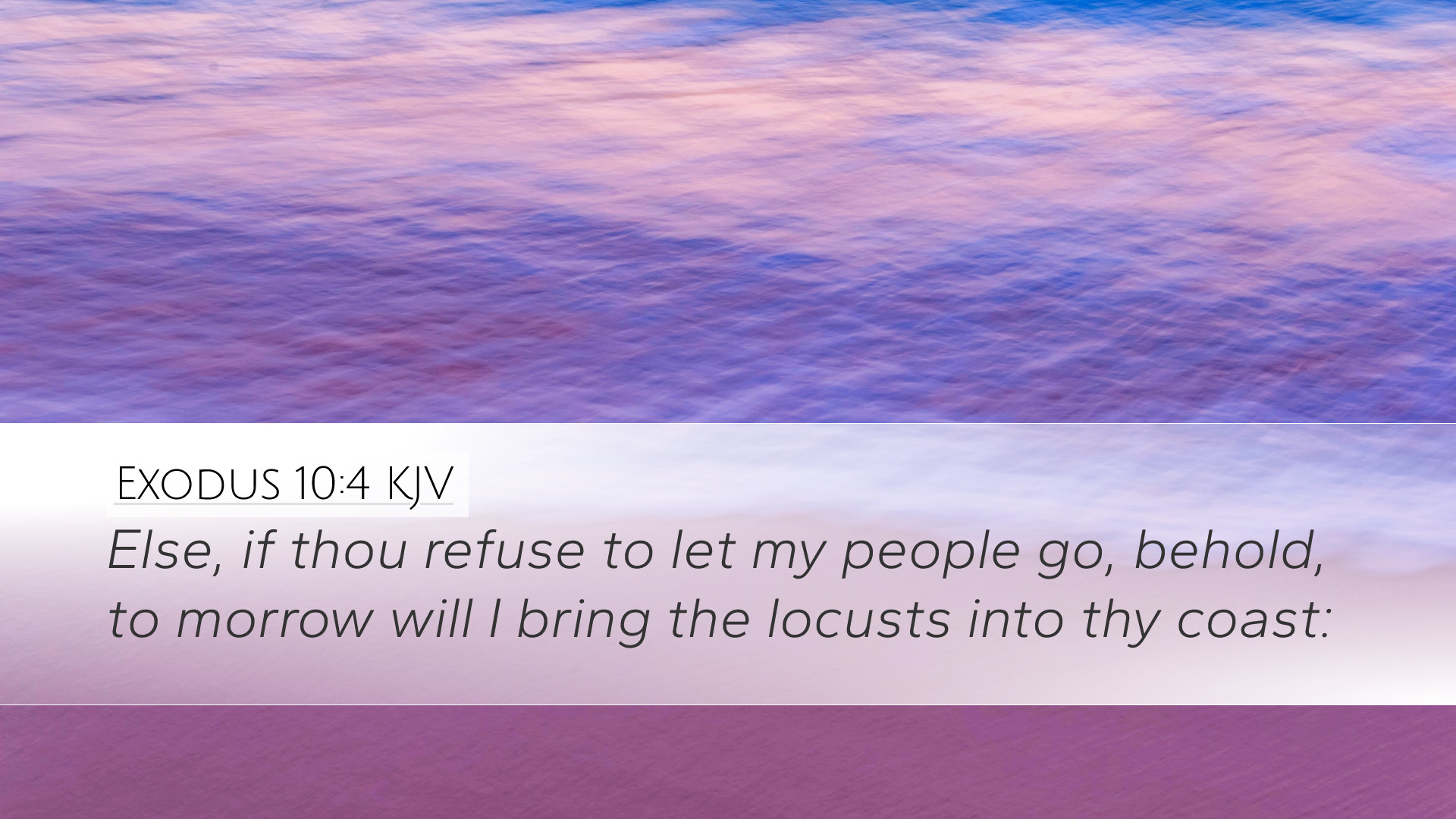Exodus 10:4 - Commentary
Verse: "If you refuse to let my people go, tomorrow I will bring locusts into your country."
Introduction
Exodus 10:4 marks a crucial moment in the narrative of the Israelites' Exodus from Egypt. It is part of the series of plagues that God sent upon Egypt to persuade Pharaoh to release the Israelites from bondage. This verse encapsulates the themes of divine authority, human obstinacy, and the consequences of disobedience. In this commentary, we will draw insights from public domain commentaries, offering a rich exploration of its theological and practical implications.
Contextual Background
Before diving deeper into the specifics of Exodus 10:4, it is essential to understand its context within the broader narrative of the Exodus. The plagues serve not only as judgment against Egypt for their oppression of the Israelites but also as a demonstration of God's power over Pharaoh and the Egyptian gods. Each plague progressively reveals the futility of resistance against divine will.
Setting the Scene
- Previous Plagues: Prior to this announcement, Egypt had already experienced nine catastrophic plagues, each aimed at breaking Pharaoh's hard heart. These included the plague of blood, frogs, gnats, flies, the death of livestock, boils, hail, locusts, and darkness.
- Pharaoh's Stubbornness: Despite the destruction wrought upon his land, Pharaoh's heart was hardened, illustrating mankind's propensity to resist divine authority.
Thematic Insights
Divine Judgment and Sovereignty
According to Albert Barnes, the plagues are significant not merely for their destructive power, but as a direct representation of God's sovereignty. The statement, "If you refuse," implies that God’s authority is absolute and that Pharaoh’s decisions are ultimately subordinate to God’s will.
Human Resistance to God’s Will
Matthew Henry emphasizes human obstinacy in facing divine commands. The recurring refusal of Pharaoh serves as a cautionary tale about the dangers of pride and arrogance before God. The forthcoming locusts serve as a symbol of the overwhelming consequences of such resistance.
Locusts: A Symbol of Devastation
The mention of locusts is not arbitrary; it invokes a vivid image of devastation that would resonate with the original audience familiar with agricultural life.
The Nature of the Plague
- Destructive Power: Adam Clarke notes that locusts are known for their ability to consume all green things, which would bring famine and suffering.
- Spiritual Implication: The locusts serve as a divine messenger, bringing judgment upon Pharaoh for his refusal and demonstrating God's control over nature.
The Role of Prophecy and Warning
Exodus 10:4 also highlights the importance of prophetic warning in Scripture. God, through Moses, provides clear forewarning to Pharaoh, indicating that God is patient and just.
God’s Mercy Before Judgment
Matthew Henry points out that the warning itself serves as an act of mercy. God gives Pharaoh ample opportunity to repent and change his course, reflecting God's desire for restoration rather than mere punishment.
Application for Today
The insights from Exodus 10:4 offer rich lessons for contemporary readers including pastors, theologians, and students of Scripture.
Lessons on Obedience and Submission
- Prompting Reflection: Pharaoh's resistance prompts believers to reflect upon their own attitudes towards divine authority. Are there areas in life where we, too, are stubbornly resisting God's clear commands?
- Consequences of Opposition: Just as Pharaoh faced dire consequences, the New Testament reiterates that God's patience has limits and that resisting His will can lead to spiritual and physical devastation.
Understanding God’s Nature
The nature of God’s judgment discussed in this verse allows theologians to explore the intricacies of divine justice and mercy. It invites believers to appreciate both aspects of God's character—His desire for holiness and His heart for the lost.
Conclusion
Exodus 10:4 is not merely a historical record but a profound theological statement about God's sovereignty, human folly, and the dire consequences of disobedience. As we reflect on these truths, it is important to approach our lives with humility, recognizing the authority of God’s word, and applying it faithfully to ensure we do not fall into the same patterns as Pharaoh. The lessons gleaned from this scripture continue to resonate, urging a devoted and obedient heart before God.


